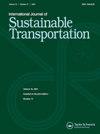Redefining the skies: How sustainable aviation fuel alters airline cost structure and market dynamics
IF 3.9
3区 工程技术
Q2 ENVIRONMENTAL STUDIES
International Journal of Sustainable Transportation
Pub Date : 2024-08-02
DOI:10.1080/15568318.2024.2397642
引用次数: 0
Abstract
Forecasts by the FAA in 2022 suggest that air travel will consistently increase over the next two decades, further escalating greenhouse gas emissions. Sustainable Aviation Fuel (SAF) is pinpointed as a potent solution for greenhouse emissions. However, its higher costs compared to conventional fuels present a challenge for its adoption. We examine the economic ramifications of SAF adoption on U.S. airlines by simulating two distinct scenarios. Our results reveal a 5.9% rise in the marginal costs (MC) of Full-Service Airlines (FSAs) with a 20% SAF blend while Low-Cost Carriers (LCCs) experience only a 1% increase under the same scenario. Alternatively, using a SAF blend that is 20% cheaper in a 50–50 ratio results in an 8.8% increase in the MC of FSAs, compared to just a 2% rise for LCCs. These scenarios suggest that the cost convergence of business models observed in recent years is unlikely to be achieved.
重新定义天空:可持续航空燃料如何改变航空公司的成本结构和市场动态
美国联邦航空局(FAA)2022 年的预测表明,航空旅行在未来二十年将持续增长,温室气体排放量将进一步增加。可持续航空燃料(SAF)被认为是解决温室气体排放的有效方法。然而,与传统燃料相比,可持续航空燃料的成本较高,这给其应用带来了挑战。我们通过模拟两种不同的情况,研究了采用 SAF 对美国航空公司的经济影响。我们的研究结果表明,使用 20% 的 SAF 混合燃料,全服务航空公司(FSA)的边际成本(MC)将上升 5.9%,而低成本航空公司(LCC)在相同情况下的边际成本仅上升 1%。另一种情况是,以 50-50 的比例混合使用便宜 20% 的 SAF,结果是全服务航空公司的 MC 增加了 8.8%,而低成本航空公司仅增加了 2%。这些情况表明,近年来观察到的商业模式成本趋同不太可能实现。
本文章由计算机程序翻译,如有差异,请以英文原文为准。
求助全文
约1分钟内获得全文
求助全文
来源期刊
CiteScore
8.90
自引率
2.60%
发文量
56
期刊介绍:
The International Journal of Sustainable Transportation provides a discussion forum for the exchange of new and innovative ideas on sustainable transportation research in the context of environmental, economical, social, and engineering aspects, as well as current and future interactions of transportation systems and other urban subsystems. The scope includes the examination of overall sustainability of any transportation system, including its infrastructure, vehicle, operation, and maintenance; the integration of social science disciplines, engineering, and information technology with transportation; the understanding of the comparative aspects of different transportation systems from a global perspective; qualitative and quantitative transportation studies; and case studies, surveys, and expository papers in an international or local context. Equal emphasis is placed on the problems of sustainable transportation that are associated with passenger and freight transportation modes in both industrialized and non-industrialized areas. All submitted manuscripts are subject to initial evaluation by the Editors and, if found suitable for further consideration, to peer review by independent, anonymous expert reviewers. All peer review is single-blind. Submissions are made online via ScholarOne Manuscripts.

 求助内容:
求助内容: 应助结果提醒方式:
应助结果提醒方式:


